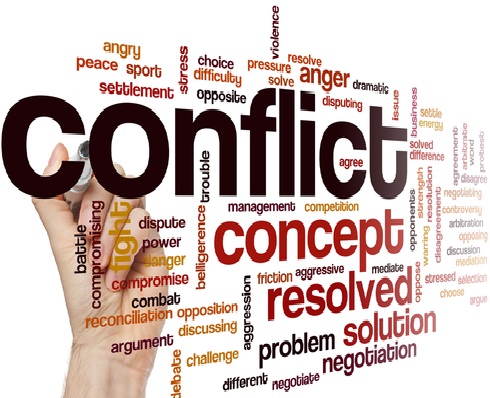Verbal De-Escalation Training in Australia: Techniques You Need to Know
07-Aug-2023

In a diverse and vibrant country like Australia, effective conflict resolution is a skill that’s essential to maintaining harmony and promoting understanding among individuals. With the sheer diversity of opinions, values, and ways of living, disagreements are inevitable. And, if these disagreements are emotionally charged, they can quickly result in conflict.
Once an emotionally charged disagreement erupts, it can be a challenging task to de-escalate the conflict, often turning the disagreement from verbal to physical conflict. Here’s where verbal de-escalation becomes an essential skill in maintaining relationships between individuals and business clients/ customers and teams.
Verbal de-escalation training plays a crucial role in equipping
workplaces (all stakeholders) with the verbal dialogue and body language techniques necessary to defuse tense situations and resolve conflicts peacefully. It’s a powerful and useful tool that will greatly benefit those entering careers in security, and indeed, any work environment where enforcing rules and regulations, may increase the risk of conflict.
In this blog post, we will explore what verbal de-escalation training is and key techniques & strategies you’ll need to know in developing your skills and attitude in dealing with benign to volatile conflict situations.
Understanding Verbal De-Escalation Training
Paragon Training’s approach to Verbal de-escalation training is a proactive approach to conflict resolution that emphasises effective communication, active listening, and strategies to solutions.
Paragon’s training approach equips individuals with the skills necessary to navigate potentially volatile situations, promoting understanding and cooperation while defusing emotional distress and aggression.
Conflict resolution is about generating compliance, where regulations, rules and the law, have to be maintained. It can be a difficult path to administer and regulate, for sure. So this is why we need to have a tactical response to verbal confrontations.
The ability to defuse a tense situation is a skill that cannot be underestimated.
Although many of us might already feel confident in day-to-day conflict resolution, without professional training, your approach, if not planned or considered before talking, may escalate the problem, not help to resolve it?
Paragon Corporate Training’s ‘Verbal de-escalation training’ covers how individuals can appropriately
- assess conflicts,
- negotiate conflicts and
- evaluate conflict responses.
Paragon’s approach to training practically outlines a robust and reputable 8 step tactical communication model for participants to apply in the role play scenarios. Following these 8 steps, students will feel confident to manage a diverse range of difficult situations. These 8 steps are covered in detail in Paragon Corporate Training’s Advanced Verbal De-escalation / Manage Conflict Training with practical application involving a professional actor.
The practical application can be tweaked to suit the relevancy of your organisation’s context. Paragon has delivered this training to agencies such as:
- Department of Primary Industry and Regional Development (DPIRD)
- Department of Justice;
- Derberl Yirrigan Indigenous Health Care (Perth);
- MEEDAC Indigenous Health Care (Geraldton)
- Department of Fisheries.
- Department of Transport.
- Department of Health (North and South Metropolitan Hospital Services).
- RSPCA.
- WA Insurance Commission.
- City of Perth Rangers.
- City of Greater Geraldton.
- Department of Commerce.
- Department of Mines and Petroleum.
Conflict Training is suitable not only for individuals who work in security positions but for anyone who works with or around people, especially in managerial or leadership positions. Possessing the skills and capabilities to verbally de-escalate situations brings a sense of order and control to situations that might otherwise feel disorderly and turbulent.
Diploma of Security Risk Management CPP50619
Key Techniques for Verbal De-Escalation
Whilst the 8-step tactical communication model will provide a clear path to follow in order to mitigate and manage conflict, there are several important factors to consider when de-escalating conflict in Australia.
Cultural Sensitivity
Australia is a culturally diverse nation, with people from various backgrounds, religions and ethnicities. Cultural sensitivity is a fundamental aspect of verbal de-escalation training in an Australian context. Recognising and respecting cultural differences, avoiding assumptions, and adapting communication styles to suit diverse perspectives are essential to fostering effective dialogue and resolving conflicts peacefully.
Mindful Communication
Mindful communication involves being aware of one’s words, tone, and non-verbal cues during a conflict. When verbal conflict arises and conversations become turbulent, the smallest change in tone or terminology can provoke conflict further. Individual’s engaging in conflict will often feel unheard, misunderstood and threatened. It’s expected in today’s society to communicate in a manner that is respectful, inclusive, and free from discriminatory language. This attitude helps create a safe environment for all parties involved, enabling open and constructive dialogue, leading to a constructive outcome….hopefully.
Building Rapport
Building rapport is crucial in de-escalating conflicts effectively. Active listening, demonstrating empathy, and showing genuine interest in understanding the concerns of others can help build rapport and trust, laying the foundation for resolving conflicts amicably. For workplaces, this is a technique that’s actioned throughout the year, encouraging relationship building to foster understanding between employees.
Emotional Regulation
Emotional regulation is a vital skill in verbal de-escalation training, arguably the most important skill. This involves managing one’s emotions and responding calmly to diffuse tense situations. Responding to conflict with more conflict will only exasperate the situation, often making the conflict worsen. Australians value self-control and emotional intelligence, so practising techniques such as deep breathing, self-awareness, and maintaining composure can greatly aid in de-escalation efforts. Although the situation may anger or offend you, it’s important to stay cool-headed and controlled in order to cool and control the conflict.
Mediation and Conflict Resolution
Verbal de-escalation training often includes techniques for mediation and conflict resolution. Australians value fairness and inclusivity, and incorporating principles of mediation, such as facilitating constructive dialogue, finding common ground, and exploring win-win solutions, can contribute to successful conflict resolution in various settings, including workplaces, schools, and community spaces. Mediation and conflict resolution is the hardest step to master and often cannot be fully completed in the situation but rather over a period of time, especially in professional contexts where an actionable resolution needs to be confirmed.
The Importance of Verbal De-Escalation
Verbal de-escalation is key to resolving conflicts. Correct conflict management shows that conflict doesn’t need to be an issue. In fact, conflict can actually be positive. Conflict can help raise issues, address problems, acknowledge differences and be the catalyst for beneficial change. However, none of this can be possible without effective verbal de-escalation.
Paragon Corporate Training’s Advanced Verbal De-Escalation Training provides individuals in Australia with invaluable tools for resolving conflicts peacefully and fostering understanding in a diverse society. By incorporating techniques such as cultural sensitivity, mindful communication, building rapport, emotional regulation, and mediation, Australians can contribute to a more harmonious and inclusive environment, where conflicts are addressed constructively, and relationships are strengthened.Improve your workplace, foster strong relationships, encourage inclusivity and create a controlled, communicative and innovative setting that benefits everyone. Reach out to Paragon Corporate Training to see how you can benefit from de-escalation training.


